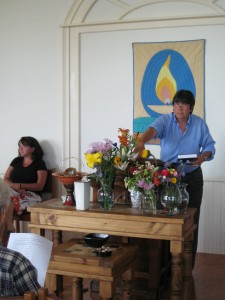Rev. Mike Quayle
Labor Day 2011
Today we pause to reflect on the meaning of Labor Day. For many of us the arrival of Labor Day marks the end of summer, schools have resumed, vacations have been taken and the church schedule returns to a predictable rhythm.
In many places, politicians emerge during Labor Day celebrations and rally their supporters with stirring speeches and great promises of what the party will accomplish in the coming year. Those seeking office use this day as a platform to rally support and gather votes.
Families gather; picnics are held; and we all hope for a final weekend of good weather.
The first Labor Day was observed in 1878 in Boston. It became a federal holiday in 1894 following the deaths of a number of worker’s at the hands of the US Military and US Marshals during the Pullman Strike. Within six days of the end of the strike and fearing more protests, congress rushed through legislation mandating a federal holiday in hopes of avoiding more violence.
For most who gather this weekend, there will be little thought about the origins of the day or reflection on the meaning of work.
I don’t know about you, but I grew up in a time and place where there was an unspoken agreement between the employer and the worker. I still recall the days when the Cleveland Cliffs Iron Company dominated the lives of my father and my uncles. Generations of Quayle’s had worked in the Iron Mines. Some had died when conditions were so unsafe that cave-ins were frequent.
Our neighborhoods were named by the mine. The mine owned all of the land and to this day homeowners hold 100 year leases on the land for the sum of $1.00.
I remember going to the company store. I can also recall when pay for the miners was in the form of “credits†at the company store with cash making up only a part of the pay.
Then the unions came in. The United Mine Workers promised that if the miners organized, they would find the good life, higher pay, freedom from intolerable work conditions and a better future for their children.
Strikes were a frequent event. Whenever the contract were about to expire, the union would present a list of demands and the Iron Company would counter. Some of the strikes went for several months and meals got very simple. When a new contract was signed, there were parties and picnics.
But, underlying all of that was a basic belief that, in the end, an agreement WOULD be reached and life would go on. We believed in the Cleveland Cliffs Iron Company and we thought they believed in us and would always be there to take care of us. Most young men who graduated from my high school had their future set. They would work in the mine as had their fathers and grandfathers. It was our way of life. [Read more…]
